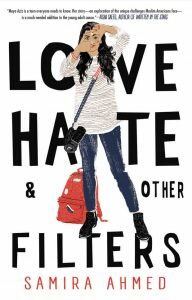My first experience with bigotry was when I was eight years old, in the midst of the Iran Hostage Crisis. It was the first time I saw fear behind my parents’ eyes—not only the worry that all Americans shared for our, but also a more personal distress for the safety of their children who were growing up in a small Midwestern town–the only Muslims, the only South Asians. For what people might say to us, for what people might do.
Their fears were well founded.
One day that summer, inching forward in a traffic jam, my parents chatting in the front seat, I rolled down my window as a car came even with ours—two adult men in the front seat. The man in the passenger seat made eye contact, rolled down his window and pointed his finger at me—an 8 year old child, too puzzled to look away, and yelled with a guttural ferocity, “Go home, you goddamned fucking Iranian.” I was stunned. I kept staring at this man, who was so moved by hatred that he felt compelled to yell at a child, a stranger. Who wanted to hold me responsible for the actions of individuals thousands of miles away. I was also confused. Why did this man think we were Iranian. Couldn’t he tell we were Indian? I learned a lot of things that day. One of them was that the visceral rage of bigots means they are immune to basic facts or civility. Another thing I learned: racists are terrible at geography. Though it was decades ago, that scene is perfectly etched in my memory —a moment of childhood innocence lost, shattered by ignorance and hatred. I knew then that I would forever be confronted by a choice: to cower or to speak.
 Writing Love, Hate & Other Filters is one of the ways I choose to speak.
Writing Love, Hate & Other Filters is one of the ways I choose to speak.
Thanks to the current political climate of hatred and fear-mongering in America, Islamophobia has been frequently in the news. It’s a buzzword. But it’s been around for decades, longer. Islam is part of the American grain. By some accounts 15%-30% of African slaves were Muslim. There is an earlier account of a Moroccan, Muslim slave who was shipwrecked off in Texas in 1528. It’s said he traveled with a few other survivors through the American southwest eventually finding his way to Mexico City. There are some pretty interesting stories about him and he’s thought to be a discoverer of New Mexico. (Someone write his story!)
Muslims have been here since before there was a United States and yet we’re feared and labeled “other.” When we say that multiculturalism is a part of America, we need to remember that so, too, is bigotry. It’s as American as apple pie and baseball and colonialism and conquest. Muslims are only about 1% of the U.S. population so it’s easy to make us scapegoats and targets of fear-mongering, much of which stems directly from the highest office in our nation.
But I have hope. If I didn’t, I wouldn’t be a writer, because even when I’m writing about horrible things, the inspiration comes from a place of hope, from my belief that even when if it feels like we are on the precipice of Mt. Doom, we have the ability to save ourselves, to be better, to form that more perfect union. The work is hard, almost impossible sometimes, it seems, and so much of the news can be discouraging. But there are so many ways to speak truth to power; to make our communities and our nation better. And each of us need to find the way we can contribute, the way we can speak, even if it’s small, even if it doesn’t feel like enough, even when we are tired and need to take a break.
Stories connect us to each other. In those moments when I log onto Twitter and see the forces of darkness spewing their bigotry, I remember the stories that connect us. I remember that I’m not alone. I remember that an 8 year old got screamed at by Islamophobes and that she grew up and remembered it and told her story and wouldn’t let them kill her spirit.
Keep reading: Take a peek at the rest of our 2018 debut author series!
Love, Hate & Other Filters is available now. Want to read Love, Hate & Other Filters? Fill out the form below to enter to win. Prizing provided by Soho Press. Open to the U.S. only. Void where prohibited.

